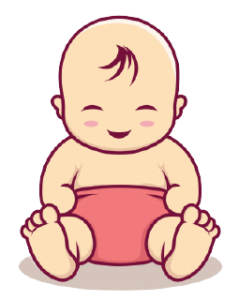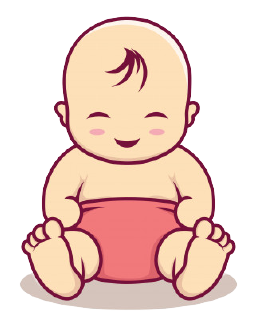When I was pregnant with my first baby, I exactly knew that I want to breastfeed my newborn. As a pediatrician, I have studied much about breastfeeding and I thought I had an idea about the rough side of it. But it did not take me more than two days from the birth of my baby boy to realize that breastfeeding is more of a struggle than I learned from the books. It is something you will figure out on your own. Your pediatrician or lactation consultant of course will be there to help you, but that exhaustion and responsibility of being someone’s only source of nutrients are unimaginable.
Breastfeeding was not an easy journey for us but we could make it work. The saying “breast is the best” is already outdated and it is up to you to make the choice considering the wellbeing of both you and your baby. If you choose to breastfeed your child, you will definitely go through the problem “when should I stop breastfeeding my child? “ Again it is a deeply personal choice. Some mothers will know and feel when to stop breastfeeding their babies but some mothers will have to research and make an informed decision. You can also continue breastfeeding till your baby self-wean and there is nothing wrong with it.
If you are one of those moms who wonder when to stop breastfeeding your child and the impact of stop breastfeeding at different ages, I have compressed all those information you need in this article. Keep reading to know what experts say about the age of weaning from breastfeeding and more.
CONTENT
1. What is the right age to stop breastfeeding?
2. What happens to breastmilk after the first year?
3. How to wean my baby from breastfeeding?
1. What is the right age to stop breastfeeding?
There is no definite age to stop breastfeeding your baby and it depends on the choice you make. Does not matter how long you breastfeed your child, it will benefit both you and the baby. You can breastfeed the baby for one year or more and these benefits will not fall in value. Let us look at the published opinion of several organizations about the age to stop breastfeeding.
It is the recommendation of all the expert organizations to exclusively breastfeed the babies for six months and continue breastfeeding for at least until the first year even after starting solid food. These organizations have different guidelines on how long to breastfeed babies.
Academy of American Pediatrics (APA) and Centers for Disease Control and Prevention (CDC) state that babies should be breastfed in the first year of their life. It is recommended to continue breastfeeding after that if both the baby and mother find it comfortable. World Health Organization (WHO) and American Academy of Family Physicians (AAFP) guides breastfeeding children for a longer duration, at least until they are two years old. AAFP reveals that breastfeeding for two years can bring extra benefits to the health of the baby. WHO recommends exclusively breastfeeding in the first six months and continuing it for two years even after starting solid food.
In a gist, you can choose to breastfeed your baby as long as it does not bother you or the baby. It is normal to breastfeed older children despite the opinion of the public. You can breastfeed your child until he self-weans. According to the AAFP, babies will self-wean from the age of 2.5 – 7 years. It is unlikely that a child will be breastfed until the age of 7, but this data will help you to keep your mind clear from the negative comments of people on breastfeeding your baby for longer.
2. What happens to breastmilk after the first year?
We have heard so many stories about how breastmilk degrade in nutritional value and turns to water. This is a myth that have been debunked years ago. The nutritional composition of your breastmilk will stay almost consistent through the first two years of your child’s life. The sodium and protein content will increase and the calcium and iron content will decrease but the composition of nutrients will basically be the same. You will be passing antibodies to your baby through breastmilk during the entire breastfeeding period which is another major benefit of not weaning early.

3. How to wean my baby from breastfeeding?
Although your baby will not be fully weaned for years, they will be partially weaned from breastmilk when they start eating solid food. Gentle and gradual weaning is the best path to take as it will give your and your baby’s body plenty of time to adapt to the new situation.
If you are planning to wean your baby from breastfeeding before their first birthday, you will have to supplement them with baby formula. Your baby is eating solid food by this age but they are eating a very little amount of other foods which is not enough to meet the nutritional requirements of a growing baby. So you will have to replace your nursing sessions with baby formula.
The process of weaning will vary according to the age of your baby. Below are the steps to follow when weaning a baby before 6 months, between 6- 12 months, and after 12 months of age.
Before six months
When weaning a baby from breastmilk before six months, you have to use baby formula as a substitute. If you were exclusively breastfeeding from the breast before, your baby will also need time to adjust to the bottle as well as to the taste of baby formula. Consult your pediatrician for the type of baby formula that suits your baby. You might have to experiment with few brands as some babies do not like the taste of certain types of baby formula. Your baby can also experience an allergy or a digestive problem as a reaction to the brand of baby formula you used.
Start by replacing one nursing session with a bottle of baby formula. Let another person feed your baby with the bottle. If you offer him the bottle, the baby might reject the bottle knowing that you have the breastmilk that he is familiar with. After few days, replace another nursing session with formula and cut off the nursing sessions until the baby is fully weaned. Taking gradual steps toward fully weaning helps to reduce breast engorgement and gives you the time to observe how well your child digests baby formula.
- Between 6 to 12 months
Your baby will start eating solid food in the sixth month of their life. These solid foods will replace one or few breastfeeding sessions. But a baby is not eating enough amount and a variety of foods to meet the nutritional requirements of his age. So if you are fully weaning your baby from breastfeeding, you will have to replace the breastfeeding sessions with baby formula.
Your baby will need time to adjust to baby formula does not matter when you switch from breastmilk to formula. Introduce baby formula gradually as described in the previous section to prevent breast engorgement and infections. Adding baby formula powder to the solid food you are feeding him is a trick to make the baby formula taste familiar to your baby. Until your baby turns one, you should offer baby formula daily to your baby as a substitute for breastmilk.
- After 12 months
Babies can drink regular milk and more water in addition to the variety of food they will be eating after their first birthday. Discuss your doctor and wean the baby fully from breastfeeding as you no longer need to replace nursing sessions with bottles of formula. A baby is emotionally attached to breastfeeding at this age so make sure it is a slow process. Offer other comforters or distractions as you slowly reduce the number of breastfeeding sessions.
4. Sudden weaning
Sudden weaning increases the chances for breast engorgement and breast infections. Both you and your baby might suffer mentally from sudden, unexpected weaning. But if there is a reason forcing you to wean your baby suddenly such as a health procedure that cannot be continued with breastfeeding, you have to replace breastmilk with baby formula or other foods depending on the age of the baby.
Pump or express a little amount of milk for few days to prevent engorged breasts. Pumping too much milk will increase your supply so be careful with the amount you pump. You can use cold compresses or cold cabbage to ease the discomfort from engorgement and swelling.


